Why Cats Are Scared of Cucumbers : Science Behind The Hidden Truth
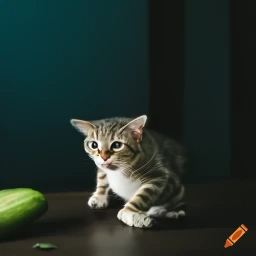
Why Cats Are Scared of Cucumbers : The Untold Truth : Ever wondered why cats go absolutely bananas when they spot a cucumber? You know, those viral videos that have taken the internet by storm? It’s like watching a feline circus act! But what’s the deal with cucumbers and their uncanny ability to turn our furry friends into scaredy-cats?
Cats are known for their curious nature and their knack for getting into all sorts of mischief. But there’s something about cucumbers that sends them running for cover faster than you can say “meow.” So, what gives?
While it may seem amusing to watch these reactions, understanding the reasons behind cats’ Scared of Cucumbers is more than just entertainment. By delving into this peculiar behavior, we can gain valuable insights into our pets’ instincts and emotions, ultimately helping us become better caretakers.
So, in this blog post, we’ll explore the fascinating world of cat psychology and uncover why these innocent green vegetables strike terror into the hearts of our beloved feline companions. Get ready to dive deep into the minds of cats as we unravel the mystery behind their cucumber phobia.
But before we embark on this intriguing journey, grab a cuppa and prepare to be amazed by what lies beneath those furry exteriors. Let’s unravel the secrets behind why cats are scared of cucumbers!
The Science Behind Cats’ Fear
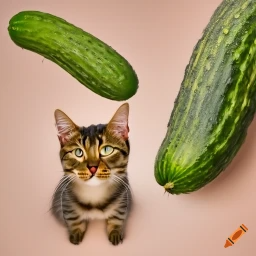
Predator-Prey Instincts: The Key to Understanding Cats’ Fear
Cats, those mysterious and independent creatures that we adore, have long been known for their curious behaviors. One such behavior that has puzzled cat owners and researchers alike is their Scared of Cucumbers. But fear not, as science may hold the key to unraveling this enigma.
Scientific studies have suggested that cats’ Scared of Cucumbers may be deeply rooted in their natural predator-prey instincts. You see, cats are descended from formidable hunters who relied on stealth and agility to survive in the wild. Their ancestors prowled through grasslands, forests, and even deserts in search of prey. This evolutionary heritage has left an indelible mark on our feline friends.
When a cucumber suddenly appears behind a cat while it is engrossed in its meal or exploring its surroundings, it triggers an instinctual response akin to encountering an unexpected predator. In nature, predators often lurk in the shadows before pouncing on their unsuspecting prey. Similarly, when a cucumber materializes out of thin air behind a cat, it disrupts their sense of security and triggers an immediate fight-or-flight response.
Evolutionary Adaptations: Cautiousness and Alertness
To fully comprehend why cats react so strongly to unexpected objects like cucumbers, we must delve into the fascinating world of evolutionary adaptations. Over countless generations, cats have honed their senses to become cautious and alert creatures. These traits were essential for their survival amidst the dangers lurking in the wilderness.
Imagine a scenario where a cat encounters a foreign object like a cucumber placed near its food bowl or while it’s leisurely lounging around the house. The sudden appearance of this unfamiliar item disrupts the cat’s perception of safety within its territory. Its heightened senses detect any potential threat immediately.
From an evolutionary standpoint, cats have learned to be wary of anything that deviates from their usual surroundings. This vigilance enables them to swiftly react to potential dangers, ensuring their survival in the wild. So, when a cucumber appears out of nowhere, it triggers an alarm within the cat’s instinctual radar, causing them to leap into action.
Startling Stimuli: Cucumbers as Unfamiliar Objects
Research has shed light on another intriguing aspect of cats’ Scared of Cucumbers – their strong reaction to unfamiliar or unexpected stimuli. Cats are known for their cautious nature and are often skeptical when confronted with new objects or situations. This innate behavior can be traced back to their evolutionary history as solitary hunters.
Picture this: you place a cucumber behind your unsuspecting feline companion while it is engrossed in grooming itself. Suddenly, it turns around and spots the green intruder lurking nearby. The sight startles the cat, triggering a reflexive response driven by its heightened sensitivity towards unfamiliar objects.
Cats rely heavily on visual cues to assess potential threats in their environment. When faced with something they don’t recognize, like a cucumber appearing out of thin air, their instincts kick in full force. Their initial reaction may involve arching their backs, hissing or even leaping away in an attempt to distance themselves from this strange entity.
Instinctual Response: Origins and Triggers
Cats are fascinating creatures with a multitude of instinctual behaviors that have been shaped over centuries of evolution.Such as cucumbers, their instinctual response is deeply ingrained in their DNA. This allows them to react quickly when faced with danger, ensuring their survival in the wild.
Sudden movements or unexpected objects can trigger a fight-or-flight response in cats. The sight of a cucumber placed behind them while they are eating or playing can startle them, causing them to jump back or flee the scene altogether. This reaction might seem exaggerated for something as harmless as a cucumber, but it stems from their survival instincts.
The instinctual response exhibited by cats towards cucumbers is believed to have originated from the need for self-preservation in the wild. In their natural habitat, cats encounter various predators and potential threats on a daily basis. Their heightened awareness and quick reflexes help them navigate these dangerous situations effectively.
To better understand why cats react strongly to cucumbers, we need to delve into the specifics of this instinctual response. Cats possess an acute sense of vision and hearing, allowing them to detect even the slightest movement or sound nearby. This sensitivity enables them to spot potential predators or prey quickly.
When a cat encounters an unexpected object like a cucumber placed behind it without warning, its immediate reaction is often one of surprise and fear. The sudden appearance triggers an adrenaline rush within the cat’s body, preparing it for either fighting off the threat or fleeing from it. This fight-or-flight response is deeply ingrained within their genetic makeup and acts as a defense mechanism against potential harm.
It’s important to note that not all cats will exhibit this strong reaction towards cucumbers. Each cat has its own unique personality and temperament which may influence how they respond to certain stimuli. However, many feline experts believe that the instinctual response to cucumbers is quite common among cats due to their shared evolutionary history.
To further illustrate this point, let’s consider an analogy. Imagine you are sitting peacefully at home, engrossed in a captivating movie. Suddenly, someone sneaks up behind you and taps you on the shoulder without warning. Your immediate reaction would likely be one of surprise and fear, causing your heart to race and your body to tense up. This instinctual response is similar to what cats experience when confronted with unexpected objects like cucumbers.
Startling Reactions: What Happens When Cats Encounter Cucumbers
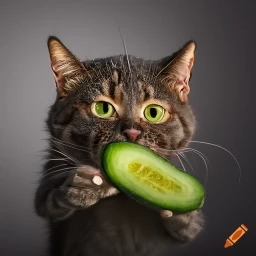
The Unexpected Encounter
Picture this: a peaceful afternoon in your living room, where your furry feline friend is casually strolling around, exploring their territory. Suddenly, out of nowhere, you place a cucumber behind them. In an instant, chaos ensues. Your cat jumps back, arches its back, hisses furiously, and bolts away as if their life depended on it. But why do cats react this way to cucumbers? Let’s dive into the intriguing world of feline psychology and explore the startling reactions when cats encounter cucumbers.
The Immediate Startle Reflex
When confronted with a cucumber placed near them without warning, many cats exhibit an immediate startle reflex. This reaction is rooted in their natural instincts for survival and self-defense. Cats are highly alert animals that rely on their acute senses to detect any potential threats in their surroundings. The sudden appearance of an unfamiliar object triggers their fight-or-flight response.
As the cucumber catches their attention, it appears as an unknown entity invading their personal space. Their instinctual reaction kicks in as they perceive the cucumber as a potential predator or danger lurking nearby. Jumping back allows them to create distance from the perceived threat while arching their backs makes them appear larger and more intimidating to ward off any potential harm.
Fearful Flight or Aggressive Hissing
In addition to jumping back and arching their backs, some cats may respond with fearful flight or aggressive hissing when encountering a cucumber unexpectedly. These reactions stem from the cat’s attempt to protect themselves from what they perceive as a dangerous situation.
Fearful flight involves rapid movement away from the cucumber in order to escape what they believe could be a threat to their safety. This behavior is akin to running away from danger and finding solace in a secure location until they feel safe again.
On the other hand, aggressive hissing is a defensive response that cats use to communicate their discomfort and establish boundaries. By hissing, they aim to intimidate the cucumber or any potential threat, warning it to keep its distance. This behavior is a clear signal that your cat feels threatened and wants the cucumber out of its territory.
The Importance of Avoiding Pranks
While it may be tempting to capture these startled reactions on camera for entertainment purposes, it’s crucial not to intentionally scare or stress out our feline friends with this kind of prank. Cats rely on us as their caregivers and trust us to provide them with a safe environment where they can feel secure.
Deliberately startling them with cucumbers can create unnecessary stress and anxiety in cats. It disrupts their sense of security within their own home, leading to long-term negative effects on their overall well-being. As responsible pet owners, we should prioritize our cats’ emotional health and avoid subjecting them to unnecessary fear-inducing situations.
Survival Instincts: Cats’ Perception of Threats
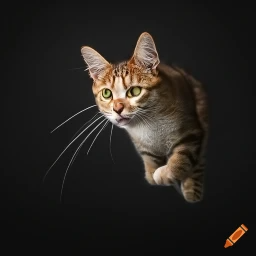
Cats Perceive Threats Based on Various Cues
Cats are known for their keen sense of awareness and ability to detect potential dangers in their environment. They rely on various cues, such as sudden movements and unfamiliar objects, to assess whether something poses a threat. These cues trigger their survival instincts, allowing them to react accordingly.
When a cat encounters an unfamiliar object, like a cucumber, it disrupts the familiar patterns in its surroundings. The sudden appearance of an object that wasn’t there before can be alarming for cats. Their natural curiosity drives them to investigate anything new or out of place, but it also triggers caution and wariness.
Heightened Sense of Awareness Helps Detect Potential Dangers
A cat’s heightened sense of awareness plays a crucial role in its ability to perceive threats accurately. Their acute senses enable them to pick up subtle changes in their environment that may indicate danger. From the slightest rustle in the bushes to the faintest scent carried by the wind, cats are attuned to even the most minor disturbances.
This heightened perception is particularly important for cats because they are both predators and prey animals. While they possess sharp claws and teeth for hunting, they must also remain vigilant against potential threats lurking around them. This constant state of alertness helps ensure their survival in the wild.
Cucumbers Resemble Potential Threats
The peculiar phenomenon of cats being scared of cucumbers has gained attention through viral videos and social media posts. Many theories have emerged regarding why this happens, but one plausible explanation lies in how cucumbers resemble snakes or other predators.
Cucumbers share similar characteristics with snakes, such as elongated shape and green coloration. This resemblance might trigger an instinctual fear response in cats due to their evolutionary history with dangerous reptiles. As ambush predators themselves, cats would naturally be cautious around objects that resemble potential threats.
It’s important to note that not all cats react the same way to cucumbers or similar objects. Each cat has its own unique set of experiences and sensitivities, so their responses may vary. Some cats may exhibit a strong fear response, while others might simply be startled or curious.
Debunking Myths: Cucumbers or Something More?
Have you ever wondered why some cats seem to be terrified of cucumbers? It’s a peculiar phenomenon that has taken the internet by storm, with countless videos showing feline reactions to these innocent green vegetables. But is it really the cucumber itself that scares them, or is there something more at play?
While it’s true that cucumbers can startle cats, it’s crucial to understand that not all cats will have the same reaction. Some felines may exhibit fear or jump in surprise when they encounter a cucumber placed near them, while others may not react at all. This individual variability suggests that there might be factors beyond just the cucumber causing these reactions.
Experts in animal behavior argue that it is not specifically cucumbers that scare cats but rather any unexpected object placed behind them. Cats are naturally cautious creatures, and sudden surprises can trigger their instinctive fight-or-flight response. When a cat turns around and sees an unfamiliar object looming behind them, their immediate reaction is often one of fear or alarm.
It’s important to consider individual differences among cats before generalizing their Scared of Cucumbers. Just because one cat reacts strongly to this particular vegetable doesn’t mean all cats will share the same response. Each cat has its own unique personality and experiences, which can influence how they perceive and react to different stimuli.
To further illustrate this point, let’s imagine a scenario where two cats encounter a cucumber for the first time:
-
Fluffy, an adventurous and fearless feline who loves exploring new things:
-
Fluffy spots the cucumber out of the corner of her eye.
-
Instead of being frightened, she approaches it curiously.
-
She sniffs and investigates the cucumber without any signs of distress.
-
-
Whiskers, a timid and easily startled cat who prefers familiar surroundings:
-
Whiskers turns around and unexpectedly sees the cucumber.
-
Startled by the sudden appearance of an unfamiliar object, he jumps back in alarm.
-
Whiskers may exhibit signs of fear such as hissing or running away.
-
In this scenario, Fluffy’s confident and curious nature allows her to approach the cucumber without fear. On the other hand, Whiskers’ timid disposition causes him to react with apprehension. This example demonstrates that a cat’s personality and previous experiences play a significant role in their response to unexpected stimuli like cucumbers.
So, next time you come across a video of a cat leaping into the air at the sight of a cucumber, remember that it’s not necessarily the vegetable itself causing the terror. Instead, it’s more likely a combination of factors such as surprise, unfamiliarity, and individual differences among cats.
Understanding these nuances can help us debunk the myth that all cats are scared of cucumbers. It reminds us to consider each cat as an individual with unique preferences and fears. While some cats may be startled by cucumbers or any unexpected object placed behind them, others may simply shrug it off or even find it intriguing.
Ultimately, let’s appreciate our feline friends for their quirks and idiosyncrasies while respecting their boundaries. If you’re ever tempted to recreate those viral videos by surprising your own cat with a cucumber, remember that it might not be as amusing for them as it is for us.
Evolutionary Perspective: Ancestral Influence on Cats’ Fear
Cats’ ancestors relied on their ability to detect and respond quickly to potential dangers in order to survive.
Imagine being a wild cat, roaming the untamed wilderness, constantly on high alert for any sign of danger. This was the reality for our feline friends’ ancestors. Survival depended on their keen senses and lightning-fast reflexes. They had to be able to detect even the slightest hint of a threat and react swiftly to ensure their survival.
Over generations, this instinctual behavior has been ingrained in domesticated cats. Despite living in our cozy homes, they still retain that ancestral need for vigilance. It’s as if they carry a little piece of the wild within them, always ready to pounce at the first sign of trouble.
This evolutionary trait has been passed down through generations, leading modern-day domesticated cats to exhibit similar behaviors when faced with perceived threats like cucumbers.
The fear that many cats display when encountering cucumbers may seem puzzling at first glance. After all, what harm could a harmless vegetable possibly pose? But remember, from an evolutionary standpoint, anything unfamiliar can trigger an alarm response in these creatures.
Cats are naturally curious animals; they investigate their surroundings thoroughly to ensure safety. When they stumble upon an unexpected object like a cucumber placed behind them while eating or grooming themselves, it triggers their primal instincts. The sudden appearance of something unknown startles them and activates their fight-or-flight response.
It’s important to note that it’s not specifically cucumbers that scare cats; rather, it is anything unexpected or surprising that triggers this reaction. In fact, you might observe similar responses if you were to place other objects behind your feline companion without their knowledge or anticipation.
Understanding this ancestral influence helps us appreciate the complexity of our feline friends’ instincts.
Our furry companions have evolved over centuries alongside humans, adapting to their new environment while still retaining traces of their wild ancestry. By recognizing and appreciating the underlying reasons behind their Scared of Cucumbers , we gain a deeper understanding of the complexity of their instincts.
It’s fascinating to witness how these ancient survival mechanisms continue to shape the behavior of our modern-day pets. Despite living in a world far removed from that of their ancestors, cats still possess an innate need for self-preservation. This knowledge allows us to approach them with empathy and respect for their natural instincts.
So next time you come across a video of a cat leaping into the air in surprise at the sight of a cucumber, remember that it’s not just about the vegetable itself. It’s a glimpse into the intricate web connecting our feline friends with their primal past, reminding us of the rich evolutionary history they carry within them.
Overcoming Fear: Tips for Cat Owners
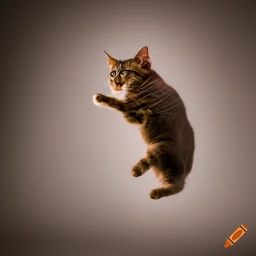
Respecting Boundaries and Avoiding Intentional Scaring
If your cat shows signs of fear towards cucumbers or other objects, it’s crucial to respect their boundaries and avoid intentionally scaring them. Cats are naturally cautious creatures, and when they encounter something unfamiliar or unexpected, it can trigger a fear response. This fear may manifest in various ways, such as running away, hiding, hissing, or even aggressive behavior.
To create a safe environment for your feline friend, make sure to observe their reactions closely. If you notice that your cat becomes anxious or scared around cucumbers or any other object, refrain from using it as a means of entertainment. While some people find amusement in the startled reaction cats have to cucumbers placed behind them while eating or drinking, this can be distressing for the animal. It’s important to remember that cats rely on us for protection and security.
Gradual Desensitization Techniques
Gradual desensitization techniques can be highly effective in helping your cat overcome their fear over time. The key is to expose them gradually and gently to the object they fear in a controlled manner. In the case of cucumbers, you can start by placing one at a distance from your cat while they are engaged in an activity they enjoy, such as playing with toys or eating their favorite treats.
The goal is to associate positive experiences with the presence of cucumbers. As your cat becomes more comfortable with the cucumber’s presence at a distance, you can gradually decrease the distance between them over multiple sessions. Remember to always monitor your cat’s body language during these sessions and ensure they feel safe throughout the process.
Providing a Safe and Secure Environment
In addition to gradual desensitization techniques, creating a safe and secure environment for your cat is essential in reducing anxiety-related reactions. Cats thrive in environments where they feel in control and have places to retreat to when they need solitude. Here are some tips to help provide a secure setting for your feline companion:
-
Designated Safe Spaces: Set up cozy hiding spots or elevated perches throughout your home where your cat can retreat to whenever they feel overwhelmed or scared. This could be a comfortable cat bed, a covered box, or even a dedicated cat tree.
-
Consistency: Establish consistent routines for feeding, playtime, and grooming. Cats appreciate predictability, and having a structured daily routine can help reduce their anxiety levels.
-
Positive Reinforcement: Reward your cat with treats, praise, or playtime whenever they exhibit calm behavior around objects that once frightened them. Positive reinforcement helps build their confidence and reinforces the idea that there is nothing to fear.
-
Avoiding Startling Noises: Loud noises can trigger fear responses in cats. Try to minimize sudden loud sounds in your home by using white noise machines or playing soothing music at low volumes.
-
Professional Help: If your cat’s fear response is severe or persistent, it may be beneficial to seek guidance from a veterinarian or animal behaviorist who specializes in feline behavior. They can provide personalized advice and develop a tailored plan to address your cat’s specific fears.
Remember that each cat is unique, and what works for one may not work for another. Patience, understanding, and empathy are key when helping your furry friend overcome their fears. By respecting their boundaries, utilizing gradual desensitization techniques, and providing a safe environment, you can support them on their journey towards feeling more secure and confident in the face of their fears.
Now that you have some strategies at hand let’s make sure we create an environment where our feline friends feel safe again!
Understanding and Addressing Cats’ Fear
Cats are fascinating creatures with their own set of fears and anxieties. As responsible pet owners, it is crucial for us to recognize and understand these natural instincts in order to provide a safe and stress-free environment for our feline companions. One particular fear that has gained attention is their aversion to cucumbers. By delving into the reasons behind this fear, we can take steps towards addressing it with patience, empathy, and positive reinforcement.
Recognizing Natural Fears
Just like humans, cats have their fair share of fears. It is essential to acknowledge that these fears are part of their instinctual behavior. While some cats may be more courageous than others, many exhibit signs of anxiety when faced with unfamiliar objects or sudden changes in their surroundings. This understanding allows us to approach their fears without judgment or ridicule.
The Mystery Behind Cucumber Fear
The internet exploded with videos showcasing cats leaping into the air at the sight of cucumbers placed behind them while they were eating or exploring their surroundings. This phenomenon sparked curiosity among cat owners worldwide, as they wondered why such a harmless vegetable could evoke such extreme reactions.
Upon closer examination, experts believe that it is not the cucumber itself that scares cats but rather the element of surprise associated with its presence. When a cat turns around after finishing its meal or investigating its surroundings and sees an unexpected object looming nearby, it triggers a startle response. This reaction is rooted in survival instincts developed over generations in the wild.
Creating a Stress-Free Environment
To help our feline friends feel secure in their environment, we can employ various strategies focused on addressing their fears surrounding cucumbers:
-
Avoid using cucumbers as props: While it may be tempting to recreate viral videos by surprising our cats with cucumbers, doing so can cause unnecessary distress and anxiety for them. Respecting their boundaries ensures a safe and stress-free environment.
-
Gradual desensitization: If your cat already exhibits fear towards cucumbers, you can gradually introduce the vegetable in a controlled manner. Start by placing a small cucumber at a distance from your cat while it is engaged in an enjoyable activity such as eating or playing. Over time, move the cucumber closer but ensure that your cat remains calm and comfortable throughout the process. This gradual exposure can help them develop a sense of security around cucumbers.
-
Positive reinforcement: Rewarding desired behaviors with treats, praise, or playtime can be an effective way to build confidence and reduce anxiety in cats. Whenever your feline companion shows bravery or remains calm in the presence of cucumbers, reinforce that behavior with positive rewards. This helps them associate cucumbers with positive experiences rather than fear.
-
Creating safe spaces: Cats seek out secure areas where they feel protected and relaxed. Providing hiding spots or designated safe zones within your home allows them to retreat when they feel anxious or overwhelmed by unfamiliar objects like cucumbers.
By employing these strategies and understanding our cats’ fears, we can create an environment that fosters their well-being and helps alleviate their anxieties surrounding cucumbers.
Introduction: Why Are Cats Scared of Cucumbers?
Have you ever wondered why cats seem to have an inexplicable Scared of Cucumbers ? It’s a peculiar phenomenon that has captured the attention of cat owners and animal behavior experts alike. While it may seem amusing to watch a cat leap into the air at the sight of a cucumber, it’s important to understand why this reaction occurs and how it can affect our feline friends.
The Natural Instincts of Cats
Cats are known for their keen senses and natural hunting instincts. They are highly attuned to their environment and constantly on alert for potential threats. This heightened awareness is what makes them such skilled predators in the wild. When a cat encounters an unfamiliar object, especially one that appears suddenly, like a cucumber placed behind them while they’re eating or sleeping, it triggers their instinctual response to perceive it as a potential danger.
In the wild, cats rely on their ability to quickly assess their surroundings for any signs of danger. Any sudden change in their environment can be seen as a threat, causing them to react defensively or attempt to flee. Cucumbers, with their elongated shape and green coloration, bear some resemblance to snakes – one of nature’s most feared predators for many animals, including cats. Therefore, when a cat sees a cucumber unexpectedly appear in its vicinity, its natural instinct is often triggered.
The Element of Surprise
One crucial factor that contributes to cats’ Scared of Cucumbers is the element of surprise. Placing a cucumber near an unsuspecting cat startles them because they do not expect such an object to be present in their familiar surroundings. This sudden shock can lead them to jump or run away in an attempt to protect themselves from what they perceive as a potential threat.
The element of surprise plays a significant role in the fear response of cats. It triggers their fight-or-flight instinct, causing an immediate reaction to either confront or escape from the perceived danger. In the case of cucumbers, their unexpected presence can create a startling effect that invokes these instinctual responses in cats.
Association and Conditioning
Another aspect that contributes to cats’ Scared of Cucumbers is association and conditioning. When a cat encounters a cucumber for the first time and has a fearful reaction, it may start associating this particular object with fear and danger. Over time, this association becomes ingrained in their memory, leading to an automatic fear response whenever they encounter cucumbers again.
Cats are known for their ability to form strong associations between certain stimuli and specific emotions or behaviors. This associative learning process helps them navigate their environment efficiently and adapt to various situations. However,This association often leads to an exaggerated fear response due to the initial shock they experienced when encountering one unexpectedly.
The Importance of Avoiding Cucumber Pranks
While it may be tempting for some people to entertain themselves by placing cucumbers behind unsuspecting cats, it’s important to recognize that this behavior can have negative consequences for our feline companions. The sudden fright caused by such pranks can lead to stress and anxiety in cats, potentially affecting their overall well-being.
As responsible pet owners, we should prioritize creating a safe and comfortable environment for our cats. This means avoiding actions that may cause unnecessary distress or compromise their trust in us. Instead of using cucumbers as props for amusement, let’s focus on providing enriching experiences and positive interactions with our furry friends.
The Science Behind Cats’ Scared of Cucumbers

What Makes Cats So Scared?
Let’s dive into the fascinating world of feline psychology and uncover the reasons behind cats’ inexplicable Scared of Cucumbers. It may seem bizarre, but this reaction is more common than you might think. Here’s what you need to know:
-
Instinctual Response: Cats are natural hunters, and their survival instincts are deeply ingrained. They have evolved to be alert and cautious in unfamiliar situations or when encountering unexpected objects. Anything that appears suddenly can trigger a fear response.
-
Unusual Shape: Cucumbers possess a unique shape that differs from the natural environment cats encounter daily. When placed behind a cat without its knowledge, it can be perceived as an unknown threat lurking in the shadows.
-
Surprise Factor: The element of surprise plays a significant role in triggering fear in cats. Placing cucumbers quietly behind them while they’re focused on something else startles them, leading to an immediate defensive reaction.
-
Associative Learning: Some experts believe that cats associate the cucumber’s appearance with snakes or other predators due to similar shapes and color patterns. This association triggers an instinctive fear response as a means of self-preservation.
-
Lack of Context: Unlike encountering new objects outdoors where there is context and space for escape, finding a cucumber indoors can be confusing for cats since they feel trapped with no clear exit strategy.
-
Heightened Awareness: Cats have exceptional senses, including acute hearing and sharp vision even in low light conditions. Their heightened awareness allows them to detect subtle changes in their surroundings instantly, making them more susceptible to sudden stimuli like cucumbers appearing out of nowhere.
-
Conditioning Effect: Once a cat has experienced fear or anxiety associated with cucumbers, it may develop a conditioned response towards similar objects. This learned fear can generalize to other items with similar characteristics, perpetuating the fear response.
The Impact on Cats’ Well-being
While it may seem amusing to witness a cat’s startled reaction to cucumbers, it is essential to consider their well-being. Sudden fright can lead to stress and anxiety in cats, which may have adverse effects on their overall health. Here are a few reasons why we should be mindful of their fears:
-
Increased Stress Levels: Frequent exposure to fearful situations can elevate a cat’s stress levels, leading to various health issues such as digestive problems, decreased appetite, and compromised immune function.
-
Negative Association: Repeated exposure to cucumber-induced fear can create negative associations with specific environments or activities where they encountered the cucumbers. This association might cause them to avoid those areas or develop anxiety-related behaviors.
-
Trust Issues: Startling a cat with unexpected stimuli like cucumbers can erode trust between the feline and its human companions. Cats may become more vigilant and wary of their surroundings, affecting the bond they share with their owners.
-
Physical Injuries: When frightened by cucumbers, cats often exhibit sudden bursts of energy as they try to escape the perceived threat rapidly. This behavior could potentially lead to accidents or injuries if they knock over objects or collide with furniture in their panic-stricken state.
Understanding why cats are scared of cucumbers allows us to approach these situations more responsibly and compassionately towards our feline friends. By minimizing unnecessary fear-inducing experiences, we can help create a safe and stress-free environment for them.
So next time you come across an adorable video online featuring a surprised kitty leaping away from a cucumber, remember that there’s more behind this reaction than meets the eye!
Understanding the Instinctual Response: Why Cats Fear Cucumbers
The Natural Prey-Predator Dynamic
Cats are natural-born hunters, and their instincts have been honed over thousands of years. One of the key factors that contribute to a cat’s Scared of Cucumbers lies in their innate prey-predator dynamic. Cats are hardwired to be cautious and on high alert when encountering unfamiliar objects or sudden movements, as they may signify potential threats.
Startling Visual Similarities
The shape and color of cucumbers can bear an uncanny resemblance to certain predators in a cat’s natural environment. Large snakes with elongated bodies share similarities in appearance with cucumbers. When cats stumble upon these green vegetables unexpectedly, it triggers an instinctual response rooted in self-preservation.
Reflexive Jumping and Startling Behavior
When a cucumber is placed near a cat without its knowledge, it often leads to startling behavior. This reflexive jumping reaction is a result of the cat’s fight-or-flight response being activated by the sudden presence of what appears to be a predator. The unexpected sight triggers an immediate surge of adrenaline, causing the cat to leap away from the perceived threat.
Associative Conditioning
Another contributing factor to cats’ Scared of Cucumbers can be attributed to associative conditioning. If a cat has encountered a cucumber before and experienced fear or discomfort during that encounter, it can create a lasting association between cucumbers and negative experiences. This learned response further intensifies their aversion towards these harmless vegetables.
Heightened Sensitivity to Environmental Changes
Cats possess highly sensitive sensory perception, allowing them to detect even subtle changes in their surroundings. Placing an object like a cucumber behind them while they eat or sleep disrupts their sense of security and control over their environment. As naturally vigilant creatures, this sudden alteration can trigger anxiety and stress responses.
Evolutionary Survival Mechanisms
The fear response to cucumbers can also be attributed to evolutionary survival mechanisms. Cats have evolved to be cautious and wary of unfamiliar objects or situations, as it helps them avoid potential dangers in their environment. This instinctual behavior has been crucial for their survival throughout history.
Avoidance of Potential Hazards
Cats are known for their meticulous grooming habits, ensuring that they remain clean and free from any external substances that could harm them. When a cucumber is placed near them, cats may perceive it as an unknown substance that could pose a threat to their well-being. Their instinctive response is to keep a safe distance from anything unfamiliar until they can assess whether it is safe or not.
The Element of Surprise
One important aspect contributing to the Scared of Cucumbers in cats is the element of surprise. When a cat turns around or looks away and suddenly notices a cucumber nearby, it startles them due to the unexpected appearance. This sudden change disrupts their sense of control over their environment and triggers an immediate defensive reaction.
Exploring the Origins: Why Are Cats Naturally Scared of Cucumbers?
The Curious Case of Cat vs. Cucumber
Have you ever wondered why cats seem to have an innate Scared of Cucumbers ? It’s a peculiar phenomenon that has captured the attention of cat owners and animal behaviorists alike. While it may seem amusing to watch videos of startled felines leaping into the air at the sight of a harmless cucumber, there is actually a scientific explanation behind this intriguing behavior.
Evolutionary Instincts: Survival Mechanisms at Play
To understand why cats are scared of cucumbers, we need to delve into their evolutionary history. Cats are natural hunters, finely tuned by millions of years of evolution to detect and respond to potential threats in their environment. Their survival instincts are deeply ingrained, allowing them to react swiftly in the face of danger.
-
The Snake Connection: One theory suggests that cats’ aversion to cucumbers stems from an instinctive fear response triggered by snake-like shapes. In the wild, encountering a snake would pose a significant threat to a cat’s safety. As a result, they have developed an inherent wariness towards long, slender objects that resemble snakes.
-
Unexpected Surprise: Another possible explanation for their fear could be attributed to the element of surprise. Cats are creatures of habit and thrive on predictability in their surroundings. When presented with something unexpected like a cucumber placed behind them while they are eating or grooming themselves, it startles them and triggers an immediate defensive reaction.
-
Conditioning through Association: Cats also possess remarkable associative learning capabilities. If they experience a startling event or encounter while near a particular object or location, they can form lasting negative associations with those stimuli. Therefore, if a cat encounters a cucumber once and experiences fear or anxiety during that incident, it may associate that feeling with cucumbers in general, leading to a fear response in subsequent encounters.
Understanding Feline Psychology: Vulnerability and Environment
Beyond evolutionary instincts, there are additional factors that contribute to why cats may be scared of cucumbers. These factors revolve around the vulnerability and environmental context in which cats find themselves.
-
Heightened Sensitivity: Cats have highly sensitive senses, particularly. Their acute hearing allows them to detect even the slightest rustle or vibration. When a cucumber is placed near them without their knowledge, the sudden appearance combined with any slight noise or movement can trigger an immediate stress response.
-
Perceived Threats: Cats are territorial creatures who value their personal space. Any intrusion into their perceived safe zone can elicit an instinctual reaction of fear or aggression. Placing a cucumber behind a cat while it is engaged in activities like eating or grooming disrupts its sense of security, leading to heightened anxiety and defensive behavior.
-
Contextual Factors: The environment in which cats encounter cucumbers also plays a role in their fearful response. For instance, if they are already feeling stressed or anxious due to changes in their routine or unfamiliar surroundings, the presence of an unexpected object like a cucumber can amplify those feelings further.
The Psychological Impact: How Cucumbers Trigger Fear in Cats
Understanding the Feline Psyche
Cats are fascinating creatures with intricate psychological patterns that can sometimes leave us scratching our heads. While they may appear confident and independent, they can also be easily startled by seemingly harmless objects. One such object that has garnered quite a bit of attention in recent years is the cucumber. Yes, you heard it right – cucumbers!
The Mysterious Scared of Cucumbers
You might have come across those viral videos where unsuspecting cats jump sky-high when confronted with a cucumber placed behind them while they eat. It’s both hilarious and perplexing to witness their exaggerated reactions. But what exactly causes this fear? Let’s delve into the feline psyche to uncover the root of this peculiar phenomenon.
Evolutionary Instincts at Play
To understand why cats are scared of cucumbers, we need to take a closer look at their evolutionary instincts. Cats are natural hunters, wired to be alert and cautious in unfamiliar situations. This heightened sense of vigilance helps them survive in the wild by detecting potential threats and ensuring their safety.
When a cat encounters an unexpected object, like a cucumber suddenly appearing behind them, it triggers their instinctive fight-or-flight response. In the wild, encountering something unfamiliar could mean encountering danger – a predator or rival animal ready to attack. Therefore, the sudden presence of an unknown object triggers an immediate fear response in cats.
Associative Learning and Conditioning
Another factor contributing to cats’ Scared of Cucumbers is associative learning and conditioning. When a cat experiences fear or anxiety in association with a specific stimulus repeatedly, they start associating that stimulus with danger or threat.
In many cases captured on camera, cats have been startled by cucumbers placed near their food bowls or while they were engrossed in eating. This creates an association between cucumbers and a negative experience, leading to an amplified fear response in subsequent encounters.
The Element of Surprise
The element of surprise also plays a significant role in cats’ Scared of Cucumbers. Cats are creatures of habit and prefer familiar environments. Any sudden change or unexpected object disrupts their sense of security, causing them to react defensively.
When a cucumber is placed behind a cat without its knowledge, it catches them off guard, triggering an immediate startle reflex. This reaction is similar to how they would respond if they encountered a potential predator sneaking up on them.
Precautions for Cat Owners
While the sight of cats leaping into the air at the mere presence of cucumbers may seem amusing, it’s important to note that intentionally scaring cats can have adverse effects on their well-being. As responsible pet owners, we should prioritize our feline friends’ emotional health and avoid subjecting them to unnecessary stress or fear-inducing situations.
If you want to introduce new objects or changes in your cat’s environment, it’s essential to do so gradually and with care. This allows them to adjust at their own pace and minimizes any potential distress caused by sudden surprises.
Unveiling the Startling Reactions: What Happens When Cats Encounter Cucumbers
The Curious Case of Cucumber Catastrophes
Cats are known for their playful and curious nature, but there is one thing that seems to send them into a frenzy of fear: cucumbers. Yes, you read that right! Many cat owners have witnessed their feline friends leaping into the air or scurrying away in terror at the mere sight of a cucumber placed near them.
The Mysterious Fear: Why Are Cats Scared of Cucumbers?
-
Natural Instincts Gone Awry
It’s important to understand that cats are instinctive hunters. Their ancestors relied on keen senses and quick reflexes to survive in the wild. This innate instinct makes them highly alert and responsive to sudden movements or unfamiliar objects, such as cucumbers.
When a cucumber unexpectedly appears behind a cat, it triggers an immediate fear response. The elongated shape and green color resemble snakes, which are natural predators of cats in the wild. This association causes an instinctual reaction, activating their fight-or-flight response.
-
Startling Surprise vs. Safe Environment
Another reason why cats react strongly to cucumbers is due to the element of surprise. Cats are creatures of habit and thrive in familiar environments where they feel safe and secure. Placing a cucumber behind them disrupts this sense of security and surprises them, leading to an exaggerated reaction.
Imagine yourself peacefully enjoying your favorite TV show when suddenly someone taps you on the shoulder without warning – you’d likely jump out of your seat too! Similarly, when a cat turns around only to find an unexpected object lurking behind them, it startles them beyond belief.
-
Conditioned Fear Response
In some cases, cats may develop a conditioned fear response towards cucumbers after experiencing a previous frightful encounter. This means that even if the initial fear was triggered by instinct, subsequent exposures to cucumbers can reinforce and amplify their fear.
Cats have excellent memory recall, especially. If they associate the presence of a cucumber with a terrifying experience, their brain wires itself to expect danger whenever they spot one again. This learned response intensifies their fear reaction over time.
The Ripple Effect: Potential Consequences of Feline Cucumber Phobia
-
Stress and Anxiety
The sudden fright caused by encountering a cucumber can leave a lasting impact on cats’ mental well-being. Continual exposure to situations that trigger fear can lead to chronic stress and anxiety in felines, affecting their overall quality of life.
Stress-related health issues such as decreased appetite, digestive problems, and compromised immune function may arise from prolonged anxiety. It is crucial for cat owners to create an environment that minimizes stress triggers to ensure their furry friends remain happy and healthy.
-
Damaged Trust
Cats are highly sensitive animals that rely on trust in their relationships with humans. When subjected to repeated scare tactics involving cucumbers, it can erode the bond between cats and their owners.
As cats associate the sudden appearance of cucumbers with feelings of fear and insecurity, they may become wary of interactions or avoid certain areas altogether. Rebuilding trust requires patience, positive reinforcement techniques, and avoiding any further exposure to cucumber-induced frights.
-
Physical Injuries
The exaggerated reactions exhibited by cats when confronted with cucumbers can potentially result in physical injuries. Leaping into the air or dashing away hastily increases the risk of accidental falls or collisions with surrounding objects.
To prevent harm, it is essential for cat owners to remove any potential hazards from the vicinity when introducing new stimuli like cucumbers into their environment. Ensuring a safe space for cats to explore without fear of injury is paramount.
The Role of Survival Instincts: Why Cats Perceive Cucumbers as Threats
Cats and their Survival Instincts
Cats are fascinating creatures, known for their agility, independence, and mysterious behavior. One aspect that truly showcases their survival instincts is how they perceive certain objects as potential threats. Among these objects, cucumbers seem to trigger an intriguing reaction in many felines. But why do cats become scared when encountering cucumbers? Let’s delve into this peculiar phenomenon and explore the underlying reasons.
Startling Encounters: The Cucumber Effect
We need to consider their innate survival instincts. Cats have evolved over thousands of years to be alert and vigilant in order to survive in the wild. They possess a highly developed fight-or-flight response system that helps them assess potential dangers in their environment.
-
The Element of Surprise: One theory suggests that the sudden appearance of a cucumber behind a cat triggers an instinctive response related to surprise or shock. As natural predators, cats rely on their acute senses to detect prey or threats around them. When they turn around and spot an unexpected object like a cucumber, it startles them due to its unanticipated presence.
-
Perceived Snake-like Shape: Another reason behind cats’ Scared of Cucumbers could be related to their resemblance to snakes. Snakes are one of the natural predators for small mammals like cats in certain regions. Over time, cats may have developed an instinctual fear response towards long, slender objects with similar characteristics.
-
Lack of Context: Context plays a significant role in how animals perceive objects or situations as threatening or harmless. In most cases where videos depict cats being startled by cucumbers, the unsuspecting feline is usually focused on eating from its food bowl or engaged in another activity unrelated to self-defense. The sudden appearance of a cucumber disrupts their sense of security and triggers an instinctive fear response.
Understanding Feline Reactions
To gain a deeper understanding of why cats react the way they do, it’s essential to consider their unique sensory perceptions and learned behaviors. Cats rely heavily on visual cues, as well as auditory and olfactory signals, to interpret their surroundings.
-
Heightened Visual Perception: Cats have excellent night vision and are highly sensitive to motion. This acute visual perception allows them to detect even subtle changes in their environment. When a cucumber suddenly appears behind them, the cat’s keen eyesight detects the movement, triggering a response that may include fear or defensive behavior.
-
Associative Learning: Over time, cats learn to associate certain objects or situations with negative experiences or potential threats. If a cat has had previous encounters with cucumbers that startled or frightened them, this learned association can contribute to their fearful reaction when faced with similar objects in the future.
-
Generalization: It is important to note that not all cats exhibit fear towards cucumbers. While some may be startled by cucumbers due to their innate survival instincts, others might not perceive them as threats at all. Each cat has its own unique personality traits and past experiences that shape how it responds to various stimuli.
The Role of Environment: How Surroundings Affect Cats’ Reaction to Cucumbers
Cats and Their Natural Instincts
Cats are fascinating creatures with unique behaviors and instincts. Understanding why cats may be scared of cucumbers requires delving into their natural instincts and the role their environment plays in shaping their reactions.
The Startling Effect of Unexpected Objects
One key reason why cats may be scared of cucumbers is the element of surprise. When a cucumber is placed near a cat without its knowledge, it suddenly appears as an unexpected object in its surroundings. This sudden appearance can startle the feline, triggering its fight-or-flight response.
Evolutionary Survival Mechanisms
Cats have evolved over thousands of years, developing survival mechanisms that helped them thrive in the wild. Their instinctual fear response to unfamiliar objects, such as cucumbers, can be traced back to this evolutionary process. In the wild, encountering something new could potentially pose a threat or indicate danger. Therefore, cats have learned to be cautious around unfamiliar objects for self-preservation purposes.
Associating Cucumbers with Potential Threats
Another reason behind cats’ Scared of Cucumbers lies in associative learning. If a cat has encountered a cucumber before and experienced a negative event simultaneously or shortly after, it may associate the cucumber with that negative experience. For example, if a cat was surprised by someone sneaking up on it while it was near a cucumber and got scared, it might develop an aversion towards cucumbers due to this association.
Sensitivity to Changes in Environment
Cats are known for being highly sensitive creatures who rely heavily on their senses to navigate their surroundings. Any sudden changes or additions to their environment can trigger anxiety or stress responses. Placing an unfamiliar object like a cucumber near them disrupts their sense of familiarity and stability, leading to unease and potential fear.
Prey Instincts and the Shape of Cucumbers
Cats are natural hunters, and their instincts are deeply ingrained in their behavior. The shape and appearance of cucumbers, with their elongated form and green color, can bear a resemblance to snakes or other predators in the eyes of a cat. This similarity might trigger their prey instinct, causing them to react defensively or with fear.
The Importance of Trust and Security
Creating a safe and secure environment for your feline friend is crucial in ensuring its overall well-being. Cats thrive on trust and familiarity, so introducing unexpected objects without warning can disrupt this sense of security. It is essential to respect their boundaries and gradually introduce new items into their surroundings to minimize any potential fear or anxiety.
Understanding Individual Differences
While many cats may exhibit fear or startle responses when encountering cucumbers, it’s important to remember that individual differences exist among felines. Not all cats will react the same way, as factors such as past experiences, personality traits, and overall temperament contribute to how they respond to unfamiliar objects like cucumbers. Some cats may not display any fear at all, while others may show extreme reactions.
Practical Tips for Cat Owners: How to Help Cats Overcome Their Scared of Cucumbers
Understanding the Fear: Why Are Cats Scared of Cucumbers?
Cats have a natural instinctual Scared of Cucumbers, and it’s important for cat owners to understand why. The fear typically arises from the sudden appearance of cucumbers, which triggers their fight-or-flight response. When a cucumber is placed near a cat without its knowledge, the unexpected sight startles them, causing them to believe it’s a potential threat.
This reaction can be attributed to cats’ innate survival instincts. In the wild, cats are always on high alert for potential predators or threats lurking around them. Therefore, any sudden object that appears in their environment can trigger an immediate stress response.
Gradual Exposure: Helping Your Cat Overcome Its Fear
If your feline friend is terrified of cucumbers, there are several practical steps you can take to help them overcome this fear gradually:
-
Create Positive Associations: Start by associating positive experiences with cucumbers. Place small slices or pieces of cucumber near your cat’s food bowl during mealtime. This will allow them to associate the presence of cucumbers with something pleasant and enjoyable.
-
Introduce Cucumber from a Distance: Begin by placing a cucumber at a distance where your cat feels comfortable and relaxed. Observe their reaction and ensure they remain calm throughout the process. Slowly decrease the distance over time as they become more accustomed to seeing the cucumber nearby.
-
Provide Rewards and Encouragement: Whenever your cat shows signs of bravery or curiosity towards the cucumber, reward them with treats or praise. This positive reinforcement will reinforce their confidence and gradually reduce their fear.
-
Desensitization Training: Utilize desensitization techniques by exposing your cat to images or videos of cucumbers in controlled environments. This method helps them become more familiar with the sight of cucumbers without triggering a fear response.
-
Avoid Startling Your Cat: It’s crucial to avoid intentionally startling your cat with cucumbers as it can heighten their fear and anxiety. Respect their boundaries and allow them to approach the cucumber at their own pace.
Alternative Approaches: Catering to Individual Needs
Every cat is unique, and some may require alternative approaches to overcome their Scared of Cucumbers. Here are a few additional tips that might help:
-
Play Therapy: Engage your cat in interactive play sessions using toys or treats while gradually introducing the presence of cucumbers nearby. This distracts them from their fear and redirects their focus towards positive experiences.
-
Consult a Professional: If your cat’s Scared of Cucumbers persists or intensifies despite your efforts, consider seeking guidance from a professional animal behaviorist or veterinarian. They can provide personalized advice tailored to your cat’s specific needs.
-
Provide Safe Spaces: Create safe spaces within your home where your cat can retreat when they feel anxious or scared. These areas should be equipped with cozy bedding, toys, and scratching posts to help alleviate stress.
By understanding the root cause of your cat’s fear and implementing these practical tips, you can gradually help them overcome their aversion to cucumbers. Remember, patience and consistency are key when working with fearful cats, so take things at their pace and celebrate every small step towards conquering this common feline phobia!
Conclusion: Understanding the Phenomenon of Cats Being Scared of Cucumbers
In conclusion, the phenomenon of cats being scared of cucumbers can be attributed to a combination of instinctual responses and learned behaviors. The science behind this fear lies in the way cats perceive their environment and interpret potential threats. While it may seem amusing to witness their startled reactions, it is important for cat owners to understand and address this fear in a compassionate manner.
Cats’ Scared of Cucumbers is rooted in their survival instincts. These instincts have been ingrained in them through generations of evolution, as they have learned to perceive certain objects as potential dangers. The sudden appearance of a cucumber triggers their fight-or-flight response, causing them to react with alarm and attempt to distance themselves from the perceived threat.
Contrary to popular belief, it is not just about cucumbers specifically. Cats may exhibit similar fearful reactions towards other unfamiliar objects that are suddenly introduced into their environment. Therefore, it is crucial to debunk the myth that cucumbers alone are responsible for this fear.
An evolutionary perspective sheds light on why cats may be naturally predisposed to fear certain objects like cucumbers. Their ancestral history as predators has shaped their sensitivity towards unexpected stimuli that could potentially harm them or disrupt their safety. This deep-rooted instinct explains why even domesticated cats display such strong reactions.
As responsible cat owners, it is our duty to help our feline companions overcome their fears. By creating a safe and secure environment for them, we can gradually expose them to these triggering stimuli in controlled ways. Patience and positive reinforcement techniques can go a long way in helping cats build confidence and reduce their fearful responses.
To summarize, understanding why cats are scared of cucumbers involves recognizing the scientific basis behind this fear, acknowledging its instinctual origins, debunking misconceptions surrounding specific triggers, considering evolutionary influences on feline behavior, and actively working towards helping cats overcome their fears.
In conclusion, if you have a cat that is scared of cucumbers or other unfamiliar objects, remember to approach the situation with empathy and understanding. By providing a supportive environment and implementing gradual exposure techniques, you can help your furry friend feel more secure and confident.
FAQs
Q: Can I play pranks on my cat by scaring it with cucumbers?
A: It is not recommended to intentionally scare your cat with cucumbers or any other object. Causing unnecessary fear or distress can have negative effects on their well-being and trust in you as their owner. It’s important to prioritize your cat’s comfort and emotional health.
Q: Are all cats scared of cucumbers?
A: No, not all cats are scared of cucumbers. While it may be a common reaction for some cats, each individual has its own unique personality and experiences that can influence their response to different stimuli. Some cats may not exhibit any fear towards cucumbers at all.
Q: How long does it take for a cat to overcome its Scared of Cucumbers?
A: The time it takes for a cat to overcome its Scared of Cucumbers can vary depending on the individual cat’s temperament and previous experiences. Patience is key when helping them through this process. It may take weeks or even months for some cats to feel comfortable around cucumbers.
Q: Should I force my cat to confront its Scared of Cucumbers?
A: No, forcing your cat to confront its fear can be counterproductive and cause further distress. Instead, focus on creating a positive environment and gradually introducing the cucumber in a controlled manner. Allow your cat to approach at its own pace while providing reassurance and rewards.
Q: What are some signs that my cat is scared of cucumbers?
A: Signs that indicate your cat may be scared of cucumbers include startled reactions such as jumping, hissing, or running away when they encounter a cucumber. They may also exhibit signs of anxiety like flattened ears, dilated pupils, or an arched back. It’s important to respect their fear and provide support.
Q: Can I use treats to help my cat overcome its Scared of Cucumbers?
A: Yes, using treats as positive reinforcement can be an effective method to help your cat associate cucumbers with something positive. By offering treats before, during, and after exposure to the cucumber, you can create a more positive experience for your cat and gradually reduce their fear response.
Q: Are there any professional resources available to help me address my cat’s Scared of Cucumbers?
A: If you are struggling to help your cat overcome its Scared of Cucumbers or any other behavioral issues, it is recommended to consult with a professional animal behaviorist or veterinarian who specializes in feline behavior. They can provide personalized guidance and strategies tailored to your specific situation.
Why Are Cats So Scared of Cucumbers? Unveiling the Mysterious Fear of Felines towards Green and Crunchy Vegetables
The Mysterious Fear of Cats: Why Are They So Scared of Cucumbers?
Cats are known for their curious and sometimes quirky behavior. One of the most puzzling behaviors observed in cats is their Scared of Cucumbers . Yes, you read that right – cucumbers! Many cat owners have shared videos online showing their feline friends leaping into the air or sprinting away in terror at the sight of a cucumber placed behind them. But why does this happen? Let’s delve into the mysterious fear of felines towards green and crunchy vegetables.
The Scared of Cucumbers in cats is not a universal phenomenon. Not all cats are scared of cucumbers, and some may not react at all. However, for those cats that do exhibit fear, it is believed to be a natural response triggered by their instinctual survival instincts.
One possible explanation for this fear is the element of surprise. Cats are creatures of habit and are always on high alert for potential threats. When a cucumber is placed behind them without their knowledge, it startles them and triggers a fear response. The sudden appearance of an unfamiliar object in their environment can be perceived as a potential danger, causing them to react defensively.
Another theory suggests that the shape and color of the cucumber may play a role in triggering the fear response. The elongated shape and green color of the cucumber may resemble a snake to a cat. Since many species of snakes are natural predators of cats, it is possible that the resemblance to a snake triggers their instinctual fear response.
Furthermore, the element of surprise combined with the sudden appearance of a snake-like object may amplify the fear response in cats. This combination creates a burst of fear and anxiety, leading to the dramatic reactions often seen in videos.
It is important to note that intentionally scaring or startling a cat with a cucumber is not recommended. This can cause unnecessary stress and anxiety for the cat, potentially leading to long-term behavioral issues. As responsible pet owners, it is our duty to provide a safe and secure environment for our feline companions.
why are cats scared of a cucumber
| Reason | Explanation |
|---|---|
| Surprise factor | Cats are naturally cautious animals, and they startle easily. When they turn around and see a cucumber unexpectedly, they are taken by surprise, which can trigger a fear response. |
| Resemblance to predators | The shape and color of a cucumber can resemble that of a snake, which is a natural predator for cats. This resemblance can instinctively trigger fear and cause cats to react defensively. |
| Lack of familiarity | Cats are creatures of habit and are wary of anything new or unfamiliar in their environment. When they encounter a cucumber placed in an unexpected location, it disrupts their sense of security and can lead to fear. |
| Conditioning | If a cat has had a previous negative experience with a cucumber or something similar, it can create a lasting association between cucumbers and fear. This conditioning can cause them to exhibit fear even in the absence of any actual threat. |
| Heightened senses | Cats have highly sensitive senses, especially when it comes to their vision and hearing. The sudden appearance of a cucumber may startle them due to the quick movement or the unfamiliar sound it makes when it falls or rolls. |
Other questions about cats scared of cucumbers
Why isn’t my cat afraid of cucumbers
Why isn’t my cat afraid of cucumbers
If you’ve ever come across those viral videos of cats leaping into the air in fright after seeing a cucumber, you might be wondering why your own cat doesn’t react the same way. While it’s true that many cats do have a Scared of Cucumbers, not all cats share this reaction. Here are a few reasons why your cat might not be afraid of cucumbers:
| Reason | Explanation |
|---|---|
| Familiarity | Cats are creatures of habit, and they tend to be more comfortable with familiar objects and environments. If your cat has been exposed to cucumbers before and nothing negative happened, they may not associate them with fear. |
| Lack of Surprise | The viral videos often show cats being startled by cucumbers placed behind them while they’re eating or distracted. If your cat is already aware of the cucumber’s presence, they may not be surprised or frightened by it. |
| Individual Personality | Just like humans, cats have unique personalities. Some cats are naturally more curious and fearless, while others are more cautious and easily startled. It’s possible that your cat simply isn’t inclined to be afraid of cucumbers. |
| Prior Experiences | Cats can develop fears and phobias based on negative experiences. If your cat has never had a negative encounter with a cucumber, they may not have a reason to be afraid. |
While not all cats are afraid of cucumbers, it’s important to note that intentionally scaring your cat with any object, including cucumbers, is not recommended. It can cause unnecessary stress and anxiety for your feline friend. If you’re concerned about your cat’s behavior or have questions about their reactions to certain objects, it’s always best to consult with a veterinarian or a professional animal behaviorist.
Remember, cats are complex creatures with their own unique quirks and preferences. What may scare one cat might not faze another. So, if your cat isn’t afraid of cucumbers, embrace their individuality and find other ways to keep them entertained and engaged. After all, there are plenty of other toys and activities that can bring joy to your furry friend’s life!


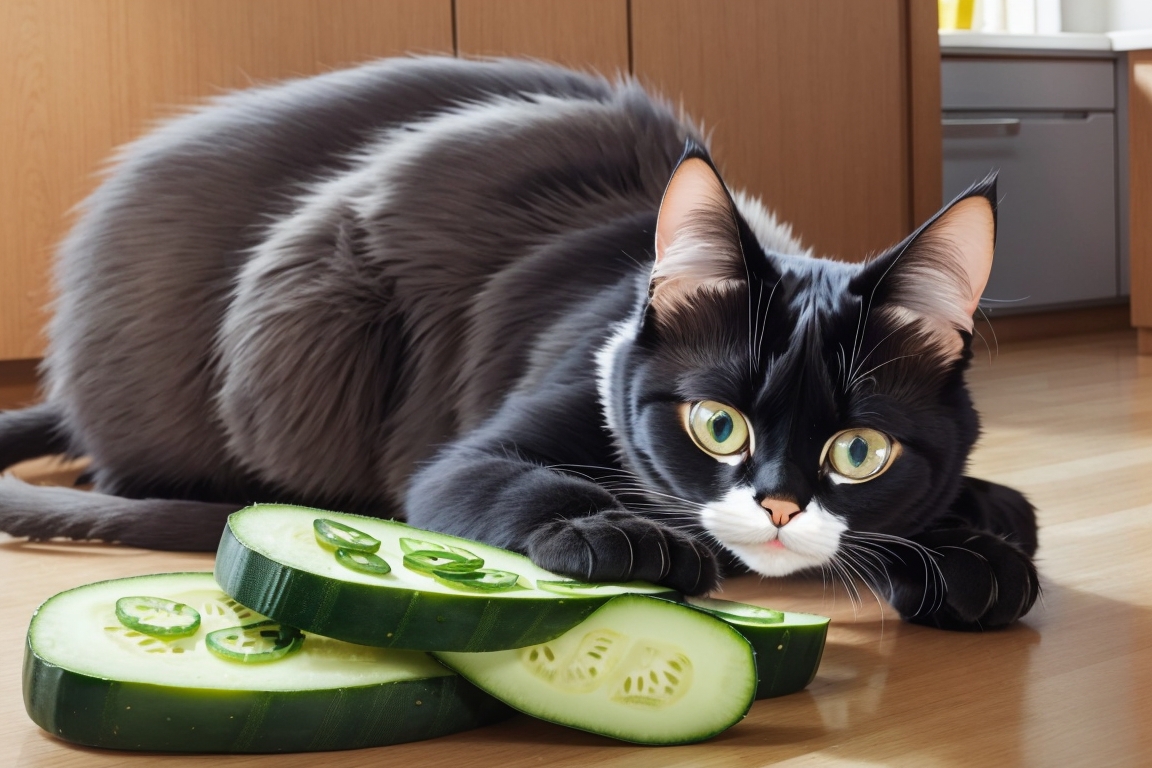
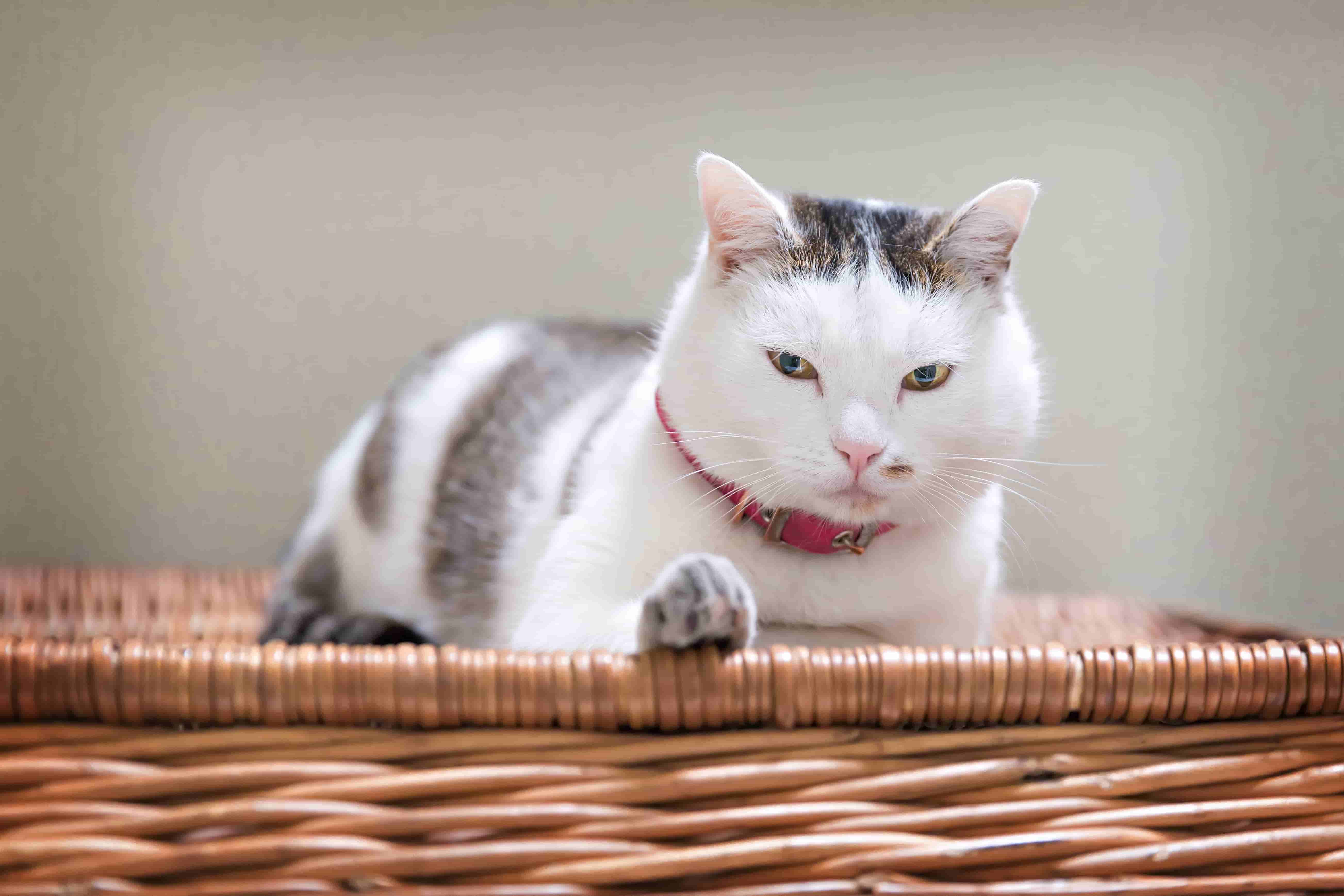
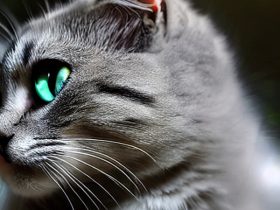

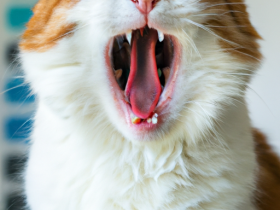

Leave a Reply
View Comments